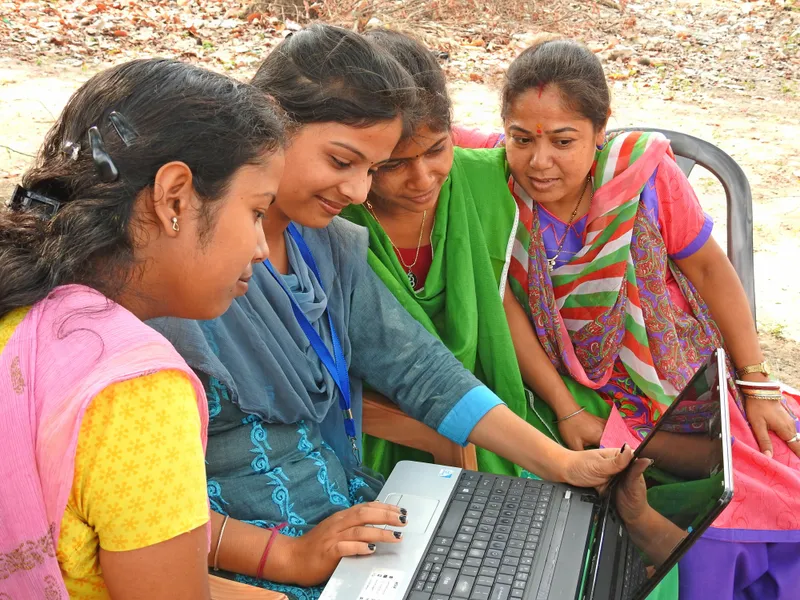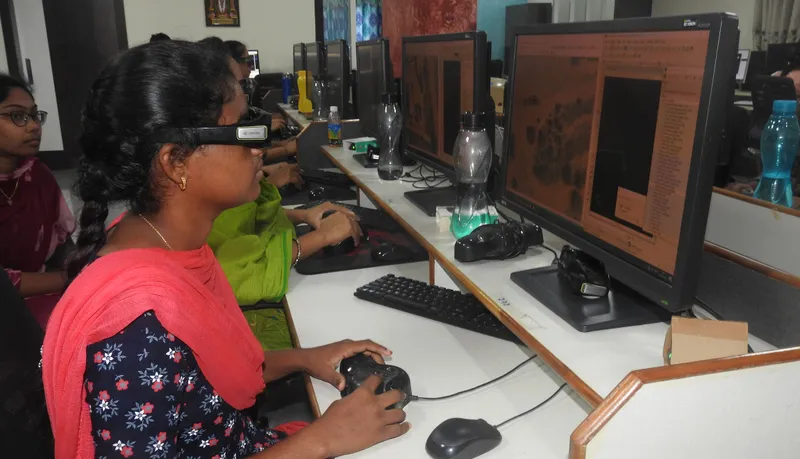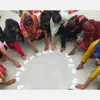How Anudip Foundation is helping poverty-stricken women, girls achieve economic independence
Anudip Foundation’s Building Entrepreneurs to Stop Trafficking (BEST) Programme provides skill development training to survivors of human trafficking, helping them achieve employment and eventually, economic independence.
Reports reveal of India’s staggering population of 1.3 billion, over 800 million are in the ‘working age group’. But about 98 percent of this number is in the informal labour force without consistent wages, security, and access to basic amenities.
Launched in 2007, Anudip Foundation is an NGO working to transform the lives of people living in the depths of poverty. Its interventions focus on working with Indian youth from economically and socially weaker sections of society—including tribal, migrants, political refugees, traffic victims, persons with disability, and women—across 18 Indian states and 57 districts.
“Our effort is to create lifelong learners, ready to access economic opportunities in an increasingly digital world thus securing for our students a life of dignity. Our theory of change is that economic independence and a mindset of learning creates social consciousness and empathetic individuals who bring change in not just their families but serve as role models in their communities and for the next generations,” says Monisha Banerjee, CEO of Anudip Foundation.

Anudip Foundation guides underprivileged women and girls to secure a dignified existence through skill training.
The vision
Anudip Foundation was set up by Dipak Basu along with several social entrepreneurs to address the critical livelihood needs of people in rural and urban India through technology. It began by establishing training centres in the Sundarbans region of eastern India in collaboration with community NGOs. The foundation provided faculty, training equipment, student mobilisation, training, and placement services.
Eventually, with feedback and recommendations from its donors, advisors, and partner NGOs, it developed market-aligned skills training and MERIT project centres, as well as an integrated model that has had a significant impact on the skilling industry.
Anudip aims to be among India’s top five entities that enable a life of dignity for marginalised communities through market-aligned skills training, building capabilities, and facilitating sustainable employment in an increasingly digital world.
To this end, the foundation wants to achieve its vision by making its beneficiaries “future-ready” with skills for the new economy’s technology-enabled careers (gig, self-made, or employed) and to serve as global citizens.
“The aim is to impart digital consciousness and important twenty-first-century skills, such as active learning, communication, workplace readiness, problem-solving, critical thinking, curiosity and self-learning and teamwork to enable them an equal chance at,” Monisha tells SocialStory.
Anudip empowers individuals from deprived sections of society through skill development job-oriented programmes that train them so that they can get hired and make a career of their own.
The NGO’s Building Entrepreneurs to Stop Trafficking (BEST) project prepares crisis-stricken survivors of human trafficking—women and girls—for sustainable and respectable occupations via skill development training.
Many of these women are rescued and reunited with their families but the social stigma prevents them from regaining the respect and the life they deserve. Anudip Foundation works with such women in Murshidabad, which is one of the most vulnerable areas with the highest instances of trafficking in the country and helps these women build their lives back with dignity and success.
Today, from mobilisers (who identify the girls and bring them to the programmes) to trainers and counsellors, there are over 600 people working for Anudip Foundation across programmes.
Empowering lives
Anudip Foundation works very closely with the women's welfare committees, district police administrations, community leaders, and others, who inform the team about the girls who need to be trained.
Since 2007, over 150,000 families and 400,000 individuals have claimed to have benefitted from the foundation’s counselling, skilling, and many technology-based livelihood programmes.
“At Anudip [Foundation], we keep a strong lens on the gender balance of our students and 100,000 of the students trained are young girls and they take up what in their communities would be termed as ‘atypical of women’ careers—working in cutting-edge technologies. Our students have on average seen a 240 percent increase in family income after securing jobs, leading to transformative, sustainable change,” Monisha explains.

Anudip provides training to physically challenged people as well
Once known as the “second Lucknow '' and amidst the old colonial buildings, Metiaburz (one of the old bustling settlements on the fringes of Kolkata) follows its own code of life. It houses one of the most conservative minority communities where its women are living reflections of gender barriers.
Anudip started its operations in Metiabruz in 2007 to empower the vibrant dreams, shaping them into a reality. Marginalised youth in India such as Sarvari Parveen found it difficult to break away from circumstantial restrictions and find employment in the digital age. Today, she is an employee at one of India’s leading digital data services.
Like Sarvari, many others who underwent the training under Anudip are now working with corporates across industries such as Accenture, Citi Bank, Unilever, Walls Farago, Capgemini etc
Monisha says, “We are privileged to have loyal and long-standing corporate partners such as Accenture, who support us in our endeavours to uplift the trafficked victims through technology and dignified livelihoods. The funds from our donors help us to continue supporting this cohort, who are extremely vulnerable and crisis-stricken.”
BEST Programme
According to a United Nations report on Office on Drug and Crime (UNODC) titled 'Anti Human Trafficking, 2013', tens of thousands of Bangladeshi women are trafficked into India every year. In Domkal, a community development block in Murshidabad, one of the centres for prostitution rackets, incidents like human trafficking are not unusual.
A 24-year-old survivor from Murshidabad who does not wish to be named says, “After being a victim of trafficking, I could not socialise due to the stigma of coercion and sexual slavery. I was then introduced to Anudip’s BEST programme where I was surprised to see many girls being trained in computer literacy and English communication.”
She underwent more than one year of training in computer skills and english comprehension from Anudip and is now working for a technology service company. “Today, the love I get from everyone is only because of the respectable profession I am engaged with,” she adds.
She was able to achieve this through Anudip’s BEST programme, which focuses on girls over the age of 17 years, providing three months of instruction, after which they are placed in online jobs to earn money.
The foundation has guided underprivileged women and girls, including victims of trafficking like her, into the national mainstream and helped them secure a dignified existence through skill training.
At present, 168 beneficiaries, who are survivors of trafficking, are now working for over more than a year since they finished their digital training and life skills training programmes with the BEST programme.
Another 90 are now getting trained, and there is the potential to reach out to at least another 100 deserving young women over the next year, with the correct support.
The foundation’s ultimate mission is to find employment opportunities for all, whether it is in the wage-based, gig-based or entrepreneurial field. “We keep innovating to achieve this goal. We are also focussing on expanding to other need-based markets to deploy the programs,” says Monisha.
Edited by Saheli Sen Gupta








